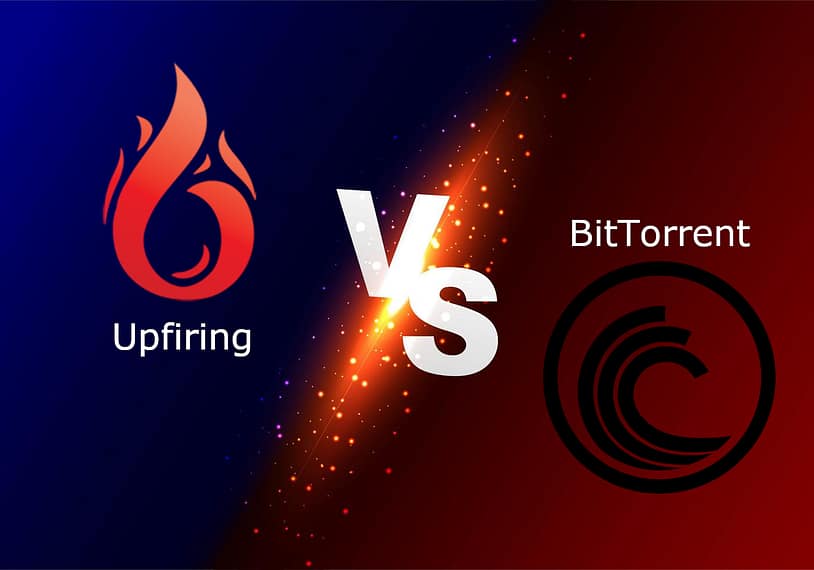File-sharing and secure file transfer are the cornerstones of the Internet. Without it, the Internet would be a much more boring place. I mean, for the consumer, all the Internet really is, is just a place to spend time in the form of entertainment, whether it be browsing memes, watching content, or gambling away your child’s college education in the form of a crypto casino. Whoah, that got dark… I digress, the internet helps you stay organized as well. In today’s work from home society, many of us would be out of a job without it.
Anywho, when it comes to file-sharing let’s go through a quick example. Bob has a copy of Movie XYZ. Alice wants a copy of Movie XYZ. Bob sends Alice a copy of that movie. The file has thus been shared. Now Annabel wants a copy too. Bob sends a copy of Annabel. Word starts to spread about Bob’s online movie emporium for distributing Copywrite free films. The hoards come. Bob’s Internet connection starts to falter. Bob is sad. Don’t be like Bob. Invest in tokenized P2P file sharing.
What is Torrenting AKA P2P File-Sharing?
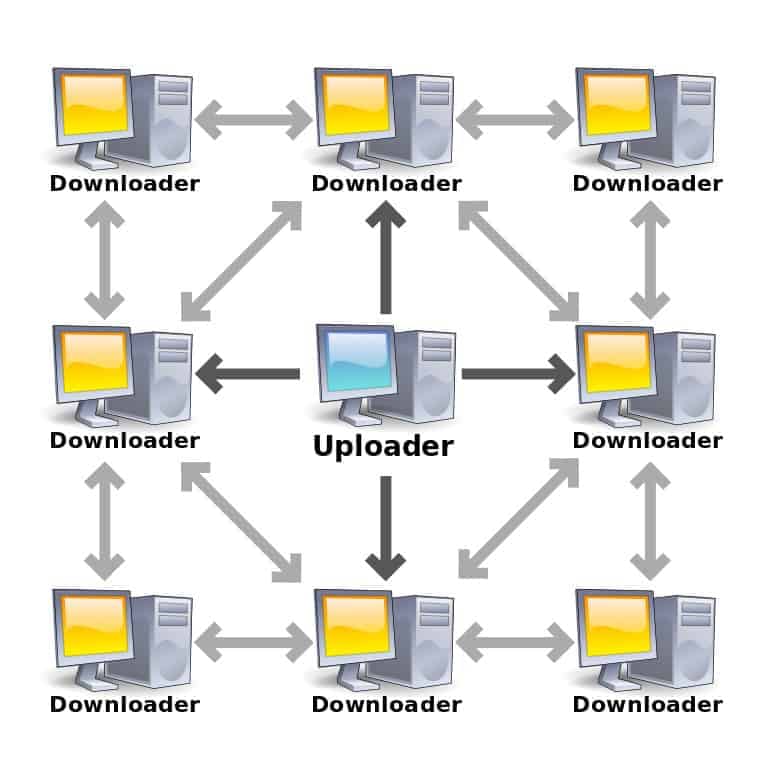
P2P or Peer to Peer file-sharing is one of the most important innovations that has come from the Internet. Torrenting, a popular protocol in P2P, is a specification of how to accomplish the task of sharing these files. This is generally done either through a .torrent file or through a magnet link. Both of those act as a formatted description of the torrent allowing your torrenting application (known as a client) to fetch you the file you would like to download.
Decentralized Protocols
Initially released all the way back in 2001, BitTorrent revolutionized the world of file-sharing. BitTorrent is a way of communicating. In technical terms, this is known as a protocol. The BitTorrent protocol allows users to send data to each other without relying on the traditional client-server architecture. This data being transmitted could be anything, from books to movies to excel spreadsheets. Some files are legal for distribution, some aren’t. This decentralized distribution model is one of the inspiration for cryptocurrencies as a whole.
How Does Torrenting Work?
When you enter a torrenting network, your computer reads the torrent’s description and does a few things. First, it contacts a server. This server sends your computer metadata regarding what seeders (computers you can download from) are available. Once your computer has this data, it then contacts the seeder computers and then starts to pull down the file at interest in parts. Once your computer receives a part, it contacts the server to let the server know that your computer can become a member of the seeder pool. When other computers need this file, the server can direct other clients to pull the parts of the file you have, from your computer, using your Internet’s upload connection. Pretty simple. This file-sharing protocol decentralizes the downloading process to evenly distribute the work between the seeders, so no one computer’s Internet connection becomes overwhelmed. At least in theory.
Faults in the Torrenting Protocol
This system of file-sharing does have its unfortunate nuances. Some users, known as leechers, can abuse this system by not contributing back to the pool of seeder computers. Leechers accomplish this by shutting down their torrent client’s connection as soon as the file they wanted is fully downloaded. This has been combatted by invite-only torrent tracking sites, which require users to maintain a certain seed to leech ratio. This is still not a perfect solution as you generally need to know someone else to get into one of these underground torrenting clubs. Not an easy task for everyone. This is where ERC20/TRC-10 crypto smart contracts come in.
A Choice in Crypto
Upfiring
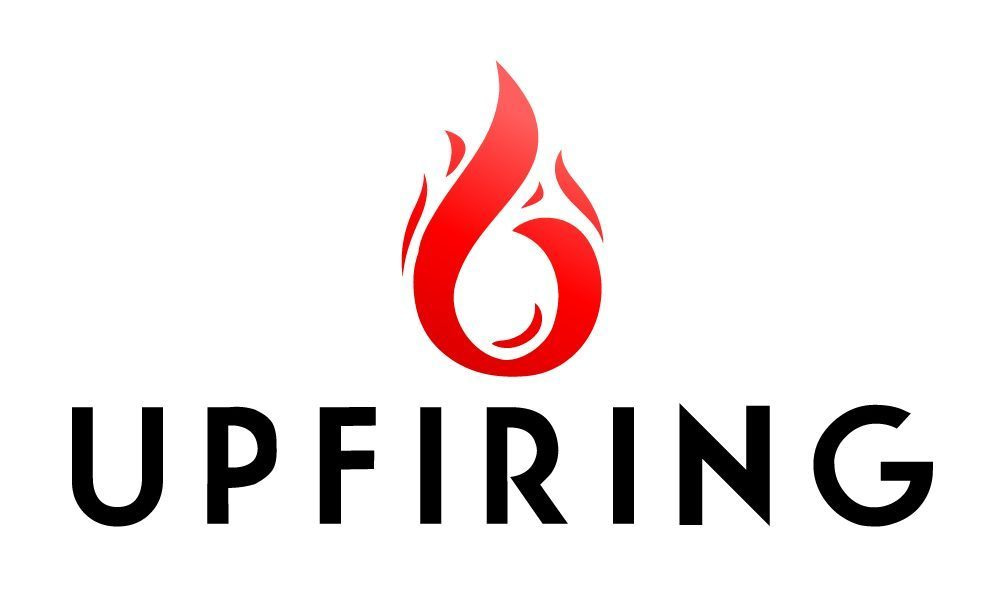
One of the newer players to the file-sharing market, Upfiring (UFR) is an ERC20 token running on the Ethereum blockchain. Upfiring boasts incentivized P2P file-sharing utilizing smart contracts. UFR is a fully decentralized file-sharing application, and yes I mean fully. Upfiring cannot be shut down.
Upfiring owns a production-ready desktop decentralized application for Windows, macOS, and Linux. This DApp distributes encrypted content files between peers. These files are pointed by Upfiring metadata files, similar to .torrent files. Users cannot decrypt a content file without paying the requisite amount of UFR.
By utilizing their bandwidth and seeding files, users quickly earn their own cryptocurrency in the form of Upfiring tokens (UFR). Ethereum smart contracts mediate the movement of both UFR and the encrypted files. This paradigm allows for trustless exchanges as well as opportunities for secure file transfer.
Join the Upfiring telegram community!
BitTorent Token
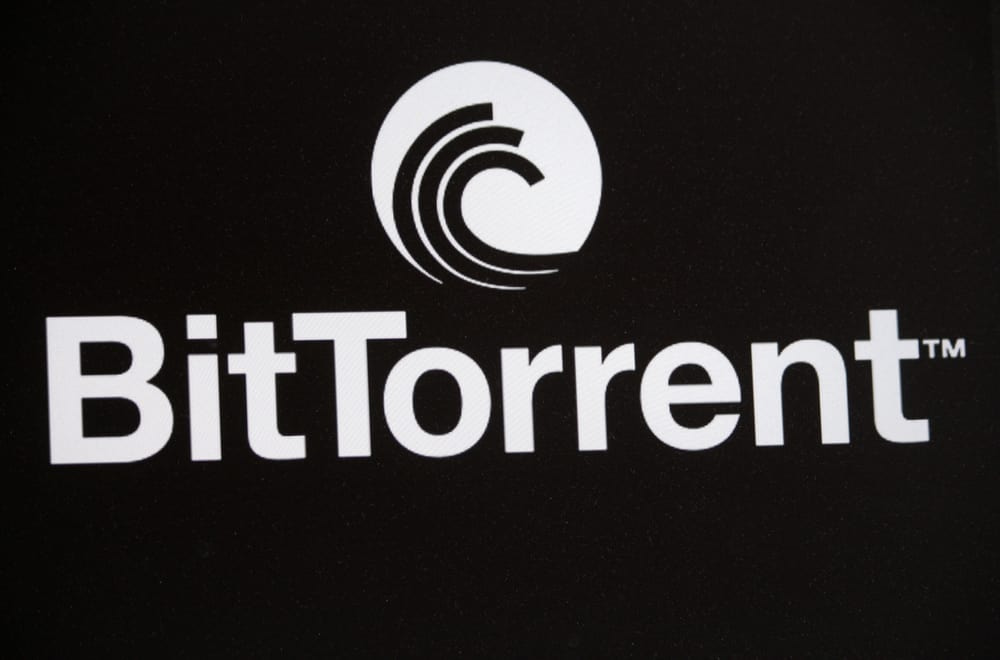
A new player to crypto, but not file-sharing, is BitTorrent Token (BTT). BTT is a TRC-10 utility token, running on the Tron Blockchain. BTT allows you the option to pay for priority in download speeds. As of today, there is no requirement to use BTT in order to download any files. With these innovations, BitTorrent hopes to promote a more robust BitTorrent protocol.
BTT is built into the ecosystem of BitTorrent and µTorrent Web, in addition to µTorrent Classic. Because seeders are receiving tokens from downloaders for faster speeds, seeders are incentivized to seed for longer periods of time and to allocate more of their bandwidth to the files that are doing well (in terms of monetization). Furthermore, downloaders are incentivized to not be a leech, so they can get paid in BTT. That being said, those who don’t mind slightly longer downloading waits won’t notice much of a difference from their previous torrenting experience.
Our Comparison
In some places legacy means something. In the fast-moving world of crypto, not so much. Let’s see how the newcomer Upfiring stacks up against the big player BitTorrent in the world of file-sharing.
Dapps Ecosystem
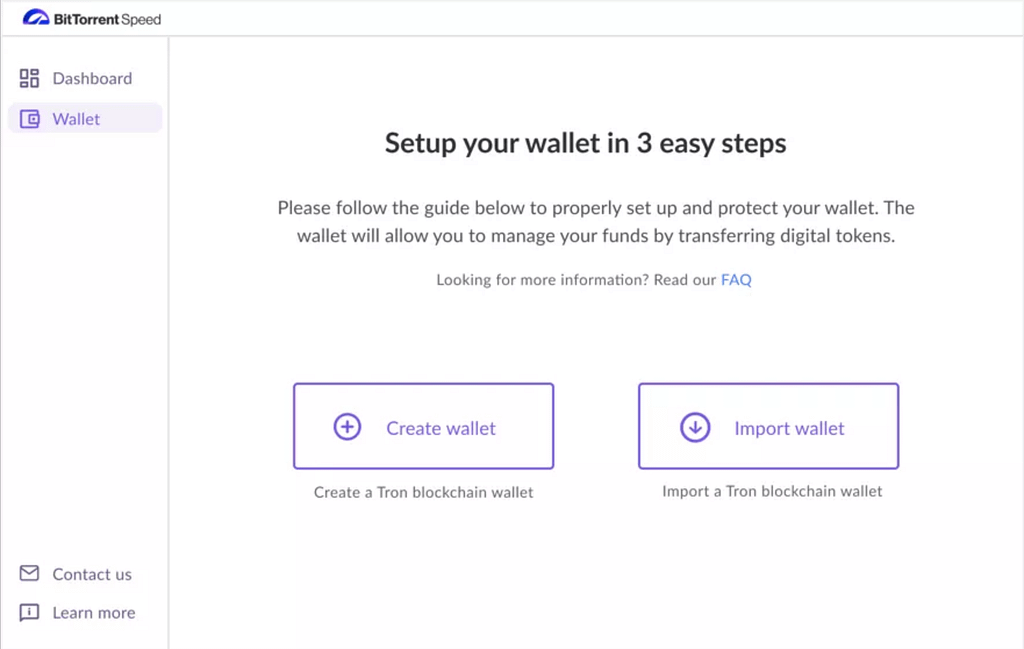
There is a rich ecosystem of file-sharing DApps powered by BTT. These include BitTorrent File System, DLive, and BitTorrent Speed. On these Dapps, you can easily attach or create a wallet to start spending for faster speeds. BitTorrent Speed automatically bids BitTorrent (BTT) for you. You can use your usual Torrent client with hopefully faster and prioritized download speeds.
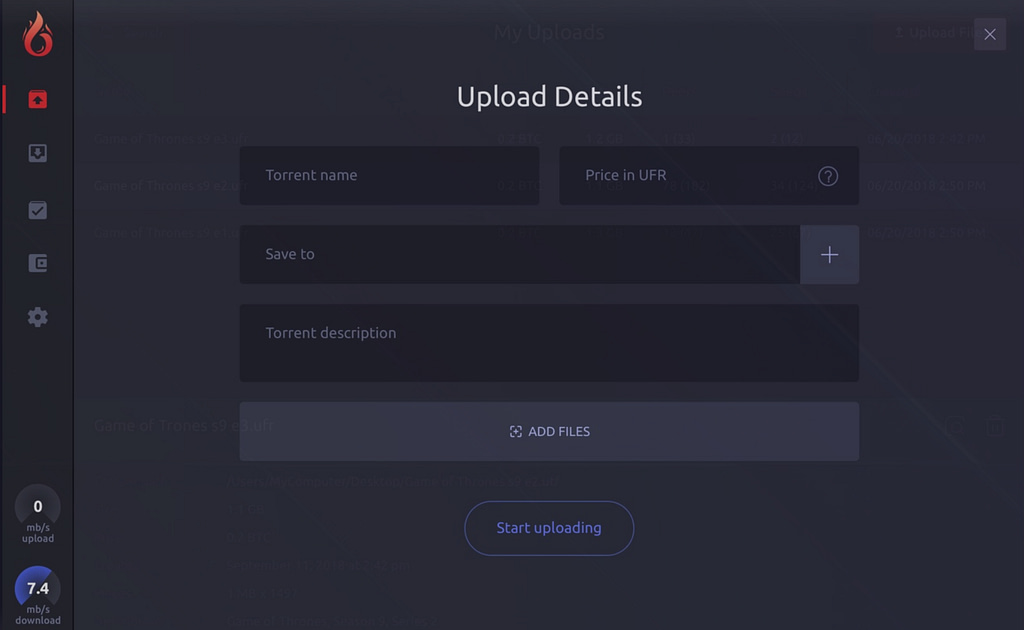
UFR’s Dapp offers an all-in-one streamlined seeding and leaching experience. Everything happens in one place. This reduction in moving parts is a boon to the user, their computer’s CPU, and their network bandwidth.
Seeder Independence
The BTT network controls the price of increasing a file’s download priority through its automated bidding system, whereas, on the UFR network, the seeder can set their own prices. In many cases, file originators on UFR are also the content creators for that file. This enables a new model of incentivized file-sharing that enables content creators and seeders to set their own prices and get paid what they believe is the true value of their own content and bandwidth.
Network Type
By definition, when it comes to P2P file-sharing, the actual downloading is shared between an array of participants (computers) known as the seeders. In BitTorrent however, there is the requirement of a centralized torrent tracker, whose purpose is to put the seeders in contact with the downloaders. The network is fully decentralized in Upfiring. As a result of this network architecture, Upfiring cannot be shut down or fully controlled by any party.
Secure File Transfer
Upfiring ensures security and DRM rights by encrypting files before throwing them over the fence into the wild. A downloader will not have access to the file until they have paid the seed. At the time the secure file transfer is complete and the downloader is paid, the content file can be decrypted.
BitTorrent Token has no method of automated file encryption and is without any plans to do so. To note, the BitTorrent seeder can choose to encrypt the file to facilliate secure file transfer
Token Usage
It is not required to use BTT to download a file. On Upfiring, it is required. Without paying, the content file will not be able to be decrypted by the end-user.
Content Creator Rewards
BitTorrent token does not pay content creators — full stop. On the other hand, Upfiring has a built in royalty and commissions system. The original creator of a file can keep earning for years to come.
Market Cap and Potential for Gains
BTT is a fairly saturated and slow-moving market. The market cap is $338,038,034 USD as of 9/16/2020.
UFR is up and coming with a fast-moving market. There is a working DApp that emphasizes the use of the token. The market cap is $3,377,451 USD USD as of 9/16/2020.
Given BTT’s lower level of volatility and the non-requirement to use BTT in order to download a file. There is much less room to make money on the coin.
To reiterate when file-sharing with Upfiring, users are required to pay UFR to download/decrypt the content files, ensuring that seeders and content creators get paid.
To Conclude
The advent of cryptocurrency, especially smart ones like Ethereum, has led to a revolution in the problems we can solve on the Internet. With proper use, the tragedy of the commons can almost entirely be avoided. People need incentives. When you are paying for a product you are more aware of its value. When you can get paid for providing, you are incentivized to keep on the gravy train. Given that Upfiring is fully based on this incentivized model it is better suited to combat this issue. Further when you need security, Upfiring’s encrypt, decrypt model could be a replacement for other secure file transfer solutions like SFTP, FTPS and others.
File-sharing was one of those resources that has suffered so much so from this common economic issue. Content creators had their content stolen. The people providing the Internet connection to fetch the content are trampled. When you have to pay for a file or for faster access to a file, this problem can go away. When you get paid for providing access you then can use your profits to consume more and for very little work. This microcosm of an economy provided by the likes of Upfiring and BitTorrent Token will revolutionize the world of file-sharing for years to come.
Note: Bitcolumnist does not endorse piracy, also, please check with your ISP before torrenting. If you lose your internet because you weren’t careful we are in no way liable. Wise words: invest in a VPN.
Our CYA Addendum…


